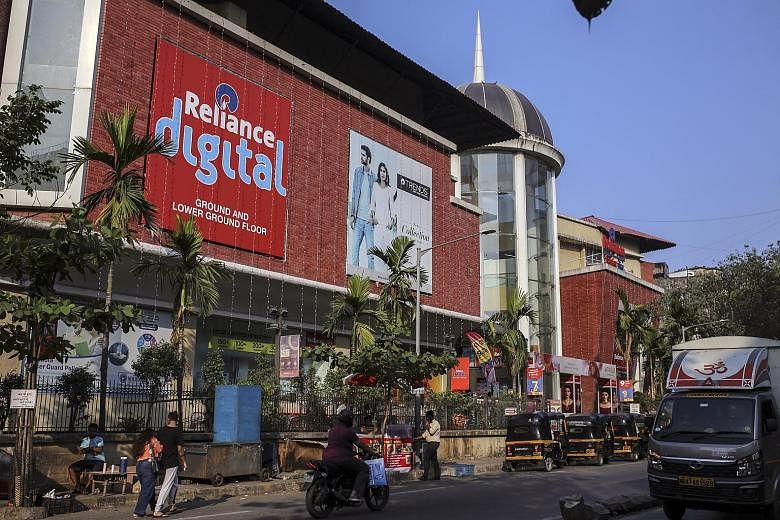MUMBAI • Billionaire Mukesh Ambani obliterated his rivals in India's telecommunications sector by selling US$2 (S$2.70) data plans and free voice calls. Four years later, he is using a very similar tactic - cut-throat pricing - to gain an edge in the country's increasingly competitive e-commerce space.
As India this week hits the peak of its biggest shopping season - the festival of Deepavali - the tycoon's retail websites, including JioMart, are elbowing their way into a space long dominated by Amazon.com and Walmart's local unit Flipkart Online Services.
Ratcheting up the competition, Mr Ambani's portals are offering blockbuster discounts of as much as 50 per cent on popular sugary confections and other holiday staples such as spice mixes.
Meanwhile, his Reliance Digital website is selling some flagship Samsung smartphones at prices lower than those of rivals, with rebates of as much as 40 per cent.
It is a push that comes as Mr Ambani's sprawling conglomerate, Reliance Industries, is flush with cash. After raising an eye-popping US$20 billion for its tech venture, it has shifted fund raising to its retail arm, which has won more than US$6 billion in investment in recent weeks from heavyweights like KKR & Co and Silver Lake.
With Reliance Retail already India's biggest brick-and-mortar retailer, Mr Ambani's online ambitions pit him against the two United States giants, Amazon and Walmart, both of which have made big investments in India.
The country, one of the last big consumer markets, is still up for grabs, and Morgan Stanley estimates India will generate US$200 billion in e-commerce sales by 2026.
Yet, Mr Ambani's triumphs in telecommunications - where he began as a tiny player but outpaced established rivals by undercutting them on price and capitalising on regulatory changes - are a cautionary tale for the American giants.
In retail, Mr Ambani's company has a huge edge: Government policies are increasingly stacked in favour of domestic retailers, of which Reliance is the largest.
Since the end of 2018, India's foreign investment rules have also barred Amazon and Flipkart from featuring exclusive products and owning inventory, in a bid to restrict their ability to directly influence prices and offer discounts.
International companies are not allowed to own more than 51 per cent of local brick-and-mortar supermarket chains. Even that limit is subject to conditions such as setting up only in cities with populations of less than one million.
With his local strategy, low-cost procurement and chain of brick-and-mortar stores, Mr Ambani can shake up online retail, said chief experience officer Siju Narayan of RexEmptor Consult in Mumbai.
"JioMart can dent the fortunes of grocery e-commerce majors like BigBasket and Grofers," he said, referring to India's biggest online grocers. "And (it can) impact the grocery, home and personal care categories of e-tail majors like Amazon and Flipkart in the coming days."
The stakes are high for the American retailers. Mr Jeff Bezos, Amazon's hard-charging founder and chief executive, has pledged to invest US$6.5 billion in India.
Walmart spent US$16 billion in 2018 to acquire Indian portal Flipkart in its biggest deal. It has invested more than US$1 billion this year in the e-tailer and steadily ploughed cash into its sister unit, payments service PhonePe.
But for Mr Ambani, 63, Asia's richest man with a net worth of US$78 billion, the e-commerce push may turn out to be tougher than telecommunications.
The wireless operators he defeated were mostly home-grown players lacking the heft, experience and deep pockets of Amazon or Walmart. Also, his group's e-commerce websites are newer than those of its rivals.
Yet, getting it right is key because Mr Ambani has cast retail and tech as the future of Reliance, which had its start in textiles under his father and progressed into petrochemicals and oil refining.
Reliance is already India's biggest company and its market capitalisation of US$185 billion equals about 6.6 per cent of India's gross domestic product.
To cement his position as the nation's No. 1 retailer, Mr Ambani bought the retail, wholesale, logistics and warehousing units of Future Group for US$3.4 billion in August. Amazon, which owns a tiny stake in an unlisted firm under the Future Group, has sought to block the sale in an arbitration court.
"It's a head-on competition in online retail," said Mr Devangshu Dutta, chief executive of retail consultancy Third Eyesight. "An extremely well capitalised, very aggressive player is the new challenger."
BLOOMBERG

